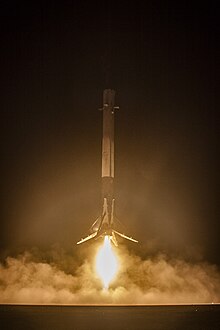SpaceX space shuttle
| SpaceX reusable launch system development program | |
|---|---|

Falcon 9 Flight 20's first stage landing vertically on solid ground in December 2015
|
|
| Commercial? | Yes |
| Type of project | Privately funded technology development |
| Products | Falcon 9, Falcon Heavy, Interplanetary Transport System |
| Location | Various |
| Owner | SpaceX |
| Founder | Elon Musk |
| Established | Publicly announced 2011 |
| Status | Active |
The SpaceX reusable launch system development program is a privately funded program to develop a set of new technologies for an orbital launch system that may be reused many times in a manner similar to the reusability of aircraft. The company SpaceX is developing the technologies over a number of years to facilitate full and rapid reusability of space launch vehicles. The project's long-term objectives include returning a launch vehicle first stage to the launch site in minutes and to return a second stage to the launch pad following orbital realignment with the launch site and atmospheric reentry in up to 24 hours. SpaceX's long term goal is that both stages of their orbital launch vehicle will be designed to allow reuse a few hours after return.
The program was publicly announced in 2011. SpaceX first achieved a successful landing and recovery of a first stage in December 2015. The first re-flight of a landed first stage occurred in March 2017 with the second occurring in June 2017, that one only five months after the maiden flight of the booster.
The reusable launch system technology was developed and initially used for the first stages of the Falcon family of rockets. After stage separation, the return process involves flipping the booster around, an optional boostback burn to reverse its course, a reentry burn, controlling direction to arrive at the landing site and a landing burn to affect the final low-altitude deceleration and touchdown.
SpaceX is intending to develop technology to extend reusable flight hardware to second stages, a more challenging engineering problem because the vehicle is travelling at orbital velocity, which is considered paramount to the plans Elon Musk is championing to enable the settlement of Mars. It is thus planned to be developed for all of the flight hardware for the new SpaceX vehicles planned to transit to Mars, with initial test flights expected no earlier than 2020. SpaceX may also experiment with second stage recovery on a few select Falcon 9 flights or Falcon Heavy flights, possibly as early as late 2017.
...
Wikipedia
